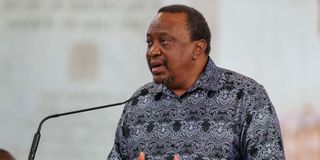CJ Koome picks commercial judges to determine Uhuru Sh4.6 trillion public debt case

Former President Uhuru Kenyatta at Holy Family Basilica in Nairobi on April 26, 2025.
What you need to know:
- Ms Koome picked justices Josephine Wambua Mong’are, Moses Ado Otieno and Francis Gikonyo.
- Three-judge bench to determine petition that seeks to hold retired President accountable for the loans.
Chief Justice Martha Koome has appointed a three-judge bench to determine a petition that is seeking to hold former President Uhuru Kenyatta and senior officials in his administration accountable for Sh4.6 trillion in loans borrowed during his tenure.
According to a notice sent to the parties on Friday by the High Court assistant deputy registrar Beja Nduke, Ms Koome picked justices Josephine Wambua Mong’are, Moses Ado Otieno and Francis Gikonyo.
The three judges sit at the High Court commercial division in Milimani, Nairobi. The case was filed by nine petitioners led by Busia senator Okiya Omtatah.
The assistant deputy registrar also asked the parties, including the National Assembly, Treasury and the Auditor General, to furnish the High Court registry with all their pleadings for purposes of preparing the hearing session.
Ms Koome expanded the bench following a finding by Justice Bahati Mwamuye that the issues raised by the petitioners were substantial questions of law concerning alleged breach of fundamental rights and the Constitution.
While calling upon the CJ to empanel the bench, Mr Mwamuye found that the issues raised regarding public debt were complex and novel.
The strength of the petition is placed in Article 226(5) of the Constitution, titled ‘accounts and audit of public entities’ and which allows public office holders, including the retired, to be held accountable for misuse of public funds.
The case revolves around accountability for the country’s rising public debt, with the petitioners alleging theft of funds borrowed by the government through sovereign bond holding, treaties, contracts, and financing agreements with other states, international financial institutions, and international corporations.
They claim that the public debt escalated during the Jubilee regime, 2013-2022. It is their case that under President Kenyatta's administration, the public debt stock rose dramatically from approximately Sh2.37 trillion (accumulated over 50 years since Independence) by June 30, 2014, to Sh8.57 trillion in eight years.
The petitioners want the former President and other senior government officials to be held liable and charged under Article 226(5) of the Constitution, for the alleged lost debts incurred between fiscal years 2014/2015 and 2021/2022.
Article 226(5) of the Constitution provides that “if the holder of a public office, including a political office, directs or approves the use of public funds contrary to law or instructions, the person is liable for any loss arising from that use and shall make good the loss, whether the person remains the holder of the office or not”.
They further state that another Sh2.2 trillion borrowed during President William Ruto’s administration constitutes odious debt.
They want former National Treasury Cabinet Secretary Prof Njuguna Ndung’u, Controller of Budget Margaret Nyakang’o, and Auditor General Nancy Gathungu held liable for the loans.
Attorney-General Dorcas Oduor has already expressed her opposition to the petition and wants it struck out.
She argues that the case would interfere with the ongoing probe on the public debt by the Auditor General. Ms Oduor says there was an ongoing audit of public debt from 1963 to last year.
In her court filings, the AG says that by directing the government to respond to the petition would compel Auditor General Gathungu to submit herself to the court, a move that she believes would be prejudicial to the ongoing audit exercise.
“The Auditor General prior to the filing of the instant Petition got seized of and is presently engaged in active audit of public debt from independence (1963) to date,” Ms Oduor says through deputy chief State Counsel Samwel Kaumba. She reveals that the Auditor General started probing the debts on September 16, 2024.
Mr Kaumba adds that the petition was filed despite the legal mandate of the Auditor General to audit and report on the public debt.
The government argues that the ongoing audit, which is meant to ascertain the current public debt stock and the acquisition process from conceptualization to utilization, is likely to be greatly undermined by the court case.
“It is the obtaining position of the law that where the Constitution has reposed specific functions in an institution or organs of state, the court must give those organs sufficient leeway to discharge their mandate. The audit offers the best opportunity to determine whether public money arising from borrowings were applied lawfully and in an effective way,” says Treasury Principal Secretary Dr Chris Kiptoo.
The case also relates to the constitutionality and legality of Kenya’s public debt borrowing and the public debt portfolio.
The Central Bank of Kenya (CBK) says the issues in the contest would directly impact the country’s economic stability and the progressive realization of socio-economic rights guaranteed under the Constitution for both present and future generations.
“The outcome of the Petition will, in all likelihood, have a direct impact on the Kenyan public, particularly in respect of public finance management and constitutional accountability; and as such, the weight, sensitivity, and public interest surrounding the Petition call for collective judicial thought to establish enduring jurisprudence on the delicate constitutional questions at stake,” says the CBK advocates.
The case is awaiting a hearing date.


